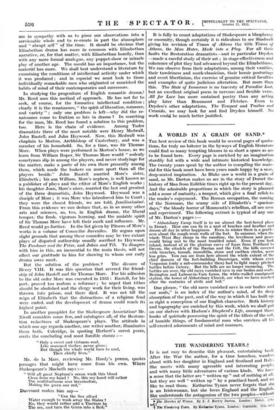A WORLD IN A . GRAIN OF SAND.* Tim best review
of this book would be several pages of quota- tions, for truly no loiterer in the byways of English literature could find so many tempting blooms in so short a space as are to be found here. Every page is enriched by an imagination sturdily fed with a wide and intimate historical knowledge. The twenty years spent by the author in compiling the mate- rial for this book must have been years made happy by a sane, deep-seated inspiration. As Blake saw a world in a grain of sand, so Mr. Darton makes us see in the story of Dorset the history of Man from Eolithic times right up to the present day. And the admirable proportions in which the story is planned add a sense of maturity, a bouquet, which give a final relish to the reader's enjoyment. The Roman occupation, the coming of the Normans, the seamy side of Elizabeth's " spacious days," the bloody horror of Monmouth's rebellion, all are seen
and experienced. The following extract is typical of any one of Mr. Darton's pages :—
" Abbotsbury Camp itself is to me almost the best-loved place in Dorset. Here one can lie in a nest of bracken and heather and dream all day in utter happiness. Even in winter there is a gentle- ness about the rough-worn walls of the fort. In summer, when the whole West Bay sleeps in the sunshine, the loveliness 'and peace would bring rest to the most troubled mind. Even- if you look inland, instead of at the glorious curve of foam from Portlandd-to Devon, the citadels of the Iberian and the Celt, the hills covered with trenches, tumuli, monoliths, stone and earthen circles, seem less grim. You can see from here almost the whole extent of the chief domain of the fort-building Durotriges, with whom even Vespasian (only a sub-commander then) had to fight many pitched battles before victory. But the hills are no longer menacing. The battles arc over, the old races vanished save in our bodies and souls. Bexington and Labour-in-Vain farms, the white-walled coastguard station, the tower of Abbotsbury Church, are what we have reached after the centuries of strife and toil."
One phrase, " the old races vanished save in our bodies and our souls," is an index of the author's mind, of its deep absorption of the past, and of the way in which it has built up so right a conception of our English character. Both history and topography are enriched by this work, which we shall put
on our shelves with Hudson's Shepherd's Life, amongst those books of quietude possessing the spirit of the tillers of the soil, of humble things, of fundamental man who survives all his self-created adornments of mind and Manners. .


































































 Previous page
Previous page